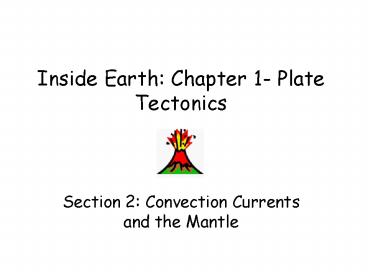Inside Earth: Chapter 1 Plate Tectonics - PowerPoint PPT Presentation
1 / 27
Title:
Inside Earth: Chapter 1 Plate Tectonics
Description:
asthenosphere ... The asthenosphere is like the soup in the pot. ... At the top of the asthenosphere, hot material spreads and forces the cooler material to sink ... – PowerPoint PPT presentation
Number of Views:63
Avg rating:3.0/5.0
Title: Inside Earth: Chapter 1 Plate Tectonics
1
Inside Earth Chapter 1- Plate Tectonics
- Section 2 Convection Currents and the Mantle
2
Guide For Reading
- How is heat transferred?
- What causes convection currents?
3
Heat Transfer
- Heat Transfer The movement of heat from a warmer
object to a cooler object - Heat is always transferred from a warmer
substance to a cooler substance
4
Explain how an ice cube would melt in your hand.
- Since heat is transferred from a warmer substance
to a cooler substance, your hand (the heat
source) melts the ice cube
5
Guide For Reading How is heat transferred?
- There are three types of heat transfer
- radiation
- conduction
- convection
6
Radiation
7
Radiation
- Radiation The transfer of heat through empty
space - Heat transfer takes place with no direct contact
between a heat source and an object
8
Give three examples of radiation.
- Sunlight
- Campfire
- Microwave oven
9
Conduction
10
Conduction
- ConductionThe transfer of heat in solid
materials - Example
- Spoon in a bowl of hot soup
11
Explain what happens when a spoon heats up in a
pot of soup?
- Heat is transferred from the hot soup and the pot
to the particles that make up the spoon - The particles near the bottom of the spoon
vibrate faster when they are heated, so they bump
into other particles and heat them too. - Gradually the entire spoon heats up
12
Give another example of conduction. Explain how
the heat is transferred.
- Stepping on sand at the beach
- The heat from the sand is transferred to your foot
13
Convection
14
Convection
- Convection Heat transfer involving the movement
of fluids-liquids and gases - Heated particles of fluid begin to flow,
transferring heat energy from one part of the
fluid to another.
15
Density
- Density A measure of how much mass there is in a
volume of a substance
16
How does density play a role in convection?
- The warmer, spread out particles of a fluid rises
and pushes the cooler, more compact particles of
a fluid down - Since fluids are constantly heated and cooled
this cycle is continuous
17
When a liquid or gas is heated, the particles
move ______ and ______ out. The density of the
liquid or gas becomes ______ dense.
- faster
- spread
- less
18
When a fluid cools, its particles move more _____
and settle together more closely. As the fluid
becomes cooler, its density _____.
- slowly
- increases
19
A _____ is a constant flow of a fluid in which
the cooler fluid sinks, while the warmer fluid
rises.
- convection current
20
Guide For Reading What causes convection
currents?
- The heating and cooling of the fluid, changes in
the fluids density, and the force of gravity
combine to set convection currents in motion.
21
CheckpointWhat is convection?
- Convection is heat transfer by the movement of a
heated fluid
22
(No Transcript)
23
Convection Currents in Earths Mantle
24
Convection currents in the earths mantle occur
in the _____.
- asthenosphere
25
Figure 10 Applying Concepts What part of
Earths interior is like the soup in a pot?
- The asthenosphere is like the soup in the pot.
26
Figure 10 Applying Concepts What part is like
the burner on the stove?
- The core and mantle are like the burner on the
stove
27
Describe how convection currents form in Earths
asthenosphere.
- Heat from Earths core and mantle cause hot
columns of mantle material to rise slowly in the
asthenosphere - At the top of the asthenosphere, hot material
spreads and forces the cooler material to sink - This cycle has continued for more than four
billion years































